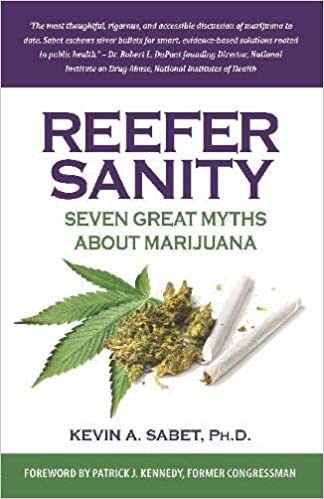The nonprofit Smart Approaches to Marijuana is spreading the word about the harm done by weed’s legalization and commercialization
By Jenny Diedrich
The country’s largest nonprofit focused on the issue of marijuana was established after a drug policy advisor and a former U.S. congressman decided it was time to start a movement.
Smart Approaches to Marijuana (SAM) was founded in 2013 by Kevin Sabet, PhD, and Rep. Patrick Kennedy (D-R.I.). The organization educates about the dangers of legalization and commercialization of marijuana and the science behind the drug, while promoting policies that decrease the drug’s use and, in turn, its consequences.
An author, consultant and former drug policy advisor to three U.S. presidential administrations, Sabet says he witnessed the public misinformation around marijuana during his work in the Obama administration.

“When I traveled the country for the White House, I could hear that people did not understand what today’s marijuana was doing and that it could be addictive,” he says. “I wrote a book called Reefer Sanity, and I thought I was going to consult and go from there. Then I saw the votes in Colorado and Washington in 2012 legalizing marijuana.”
Sabet and Kennedy formed SAM to focus on putting public health and safety ahead of the interests of the marijuana industry. “[Smart Approaches to Marijuana] doesn’t take money from the marijuana industry, and we’ve made a point to talk about big marijuana,” Sabet says. “It’s really addiction for profit. We saw it before with the tobacco industry, and we’re seeing it again with the marijuana industry.”
The Dangers of Marijuana
Sabet says people are unaware that the marijuana sold today is more addictive than that of yesteryear due to increased THC content. THC is the main psychoactive compound in marijuana and produces the sensation of being high.
People don’t understand the potency of today’s marijuana. That’s the reason it’s more addictive. One out of three marijuana users who have used in the last year reached the criteria for dependency or abuse.”
Kevin Sabet, co-founder, Smart Approaches to Marijuana
“Today’s marijuana is not the marijuana of the past. It’s not 4% THC. It can be up to 99% THC. I have legislators come up to me in states around the country that have legalized but didn’t know it could get up to 99%. They thought we regulated THC content,” he says. “People don’t understand the potency of today’s marijuana. That’s the reason it’s more addictive. One out of three marijuana users who have used in the last year reached the criteria for dependency or abuse.”
Furthermore, the marijuana industry’s sale of edibles containing THC increases the danger, Sabet says. “As smoking has become less in vogue, it’s now available in cookies and candies. This is all done on purpose. It’s done to make money.”
While SAM opposes legalization of marijuana, the organization does support decriminalization. Sabet says the two often are lumped together but are separate issues. Smart Approaches to Marijuana seeks a “middle road between incarceration and legalization,” according to its website.

“We don’t want people to have records for low-level use,” Sabet says. “We want people to live positive lives where they can be free from addiction. I really worry about our rush so fast toward the legalization and commercialization of all drugs. We have the worst drug problem we’ve ever had in this country, and yet we’re embracing legal use of marijuana. We really have to slow down.”
Although he’s not a marijuana user or in recovery from substance misuse himself, Sabet has seen countless people affected. He cites this as the reason for his passion surrounding the issue:
“I’ve seen tragedies. I’ve seen parents having to spend their child’s college savings fund on treatment for marijuana. Today I was contacted by a child psychiatrist who is experiencing huge issues with his adolescent population, and parents who think [marijuana is] no big deal. Their 4.0 grade-point average becomes a 2.0 in a matter of weeks, and their lives begin to unravel. There’s so much denial.
“It can be so difficult for people to understand that it’s an actual issue. That’s part of why it’s so sinister.”
Photo: Yoann Boyer














